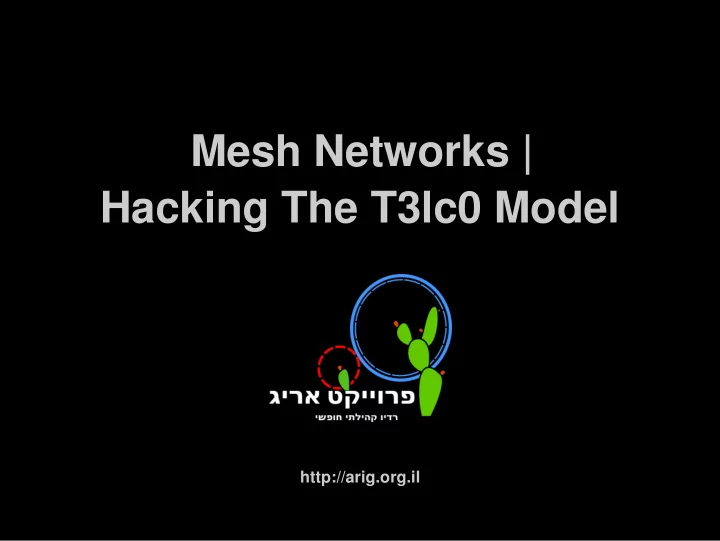

Mesh Networks | Hacking The T3lc0 Model http://arig.org.il
What's a Mesh Anyway ? Mesh = topology. anything not a star / bus / ring / tree Nodes = routers, smart phones, cars – anything wi-fi enabled Links = wireless connections Mesh Network Attributes: Self-organizing Self-healing Scalable Robust, hard to disconnect
Mesh Node Recipe 1x 802.11 compatible radio device 1x radio driver, eg. atheros 1x Foss OS: eg. OpenWRT 1x Mesh Protocol BGP, layer 7 ( uses TCP, port 179 ) & OSPF ( IP datagram encapsulated ) OLSR, layer 3 ( uses UDP packets ) B.A.T.M.A.N, layer 2 ( raw ethernet frames, kernel module)
Radio Use of public 2.4GHz & 5GHz bands No special license to operation 3.7GHz also recently made available Open Spectrum: public radio frequency access Open Source Cell Phone Network at $2 per month
Mesh Protocols Protocol Tasks: Node announcement Neighbor sensing Routing table upkeep Routing decisions Protocol Efficiency Metrics maximize: raw data minimize: control Data / ( control Data + raw Data ) > 70 implementation, lots of academic Interest
The Problem Present Routers, No Inter-Communication Low Service Improvement Incentive Centralized Power, Censorship No Service Improvement Incentive Infrastructure Vulnerability: Crisis Scenarios Cellular Service Failure (Cellcom, 2010)
The Solution part of a Solution: Mesh Network Open Mesh: Open Source, Open Standards Affordable Community Owned User Operated Induce ISP Service Improvement ( mozilla effect )
History, by Device: WRT54G Story of the Source Code: 1. Andrew Miklas posts on the Kernel Mailing List: # dd if=WRT54G_1.02.1_US_code.bin of=test.dump skip=24577c bs=32c # mount -t cramfs test.dump /mnt 2. GPL requires Linksys to publish source code 3. pressure... 4. $$$ profit! : Linksys open sourced the WRT54G firmware in July 2003 A 60$ turns into a 600$ corporate router ! Unlocked features: shell access, run VPN / VoIP servers, use as a repeater or a bridge → mesh possible
History, by Device - XO-1 100$ laptop per child Project Mesh to Provide Classroom & Village connectivity Partial 802.11s implementation ( no security for example ) Plug-n-Play, at least in theory: # iwconfig msh0 mode ad-hoc channel 13 essid hello-mesh-world # ifconfig msh0 <IP address> Disappointing real-world performance Low powered radio → short range
History, by Network: Consume.net England, 2001, 1000+ list members, ~200 nodes Context: dialup, 512Kbps = $60,000 Clink Street Building Internet Sharing: Artists, Photographers, Filmmakers, etc. Expand to 2 nd building → cross a 5m wide street: running cables across the street is illegal ! Buy a $4000 Breezecom AP10 ( 2Mbps, 100 users, 4 years uptime! ) Low cost, 802.11b PCMCIA cards motto: Consume the net !
Pico-Peering Agreement Written by the Consume.net founders. Key points: Free Transit: Owner agrees to provide free transit across their free network. Owner agrees not to modify/interfere with data as it passes through their free network. Open Communication: The owner agrees to publish the information necessary for peering to take place This information shall be published under a free license The owner agrees to be contactable and will provide at least an email adress No Warranty Terms of Use: The owner is entitled to formulate an 'acceptable use policy' This may or may not contain information about additional services provided
History, by Network: Freifunk Germany, 2002 Context: Post Unification, East-Germany: Fiber Internet project: 1. rip out all PSTN copper 2. install fiber lines Project budget overrun → end users left with nothing ! Early Start: PCs on rooftops Very fast adoption Active today, strong hacking culture
History, by Network: AWMN Greece, 2002 Small group of dissatisfied tech'ies ~1120 backbone nodes, > 2500 ap clients DIY mentality
History, by Network: Guifi.net Catalonia, 2004 Context: poor Internet access in rural areas ~13.500 nodes - likely the biggest in the world Lots of accumulated experience Strong community back
Mesh Network Services Network wide: IP assignment, DNS Mass Communication: VoIP Municipal Notification Service, e.g. Shderot Broadcast, Multicast: local radio, podcasts, etc. P2P services: file sharing, social networks Distributed Services: cache, backup, DNS Sensor Networks
In the News... Mediterranean, 2008: Submarine Cable Disruption 5 ! cables cut Israel only connected with two Israel, Dec. 2010: Cellcom Service Downtime Egypt, Jan. 28 2011 ( see also: Yeman, Lybia, Syria ): Internet shutdown. nothing fancy, simply power off ! Disruptions third world exclusive? no: Aug. 2011, San Francisco: BART cut cell service to avert protest US, 2011, State Department: spending > $70 million on “shadow networks”
Israel, 2011: Internet = 'גטוק ? Users forced into dual subscription: תיתשת ,קפס , the only country ! Slower speed = more money Private, al la 'NGN' style user separation
Israel, 2011: The 'Law' ערה ןושל קוח ןוקית : :םישלוג יטרפ תפישח
Are we happy with this design ?
גירא טקייורפ Israel is way behind - about ~10 years ! Vision: Open, Community dedicated mesh גירא != ISP ISP, גירא co-existence Community owned, operated Learn from past attempts Israeli housing protest: inter camp connection effort Global Cooperation - Funkfeuer.at: CNDB ( common node DB schema ) development Borrowed public IPv6 block
Technical Challenges Spectrum Congestion Limited Wi-Fi Range Central Network Services: Node ID Assignment: IP / MAC DNS Servers Layer 8: User Resource Sharing
Sustainability is Key ++node operators, not nodes. ++mesh communities, not mesh networks.
Security OpenWRT Dual-Mode: WPA enabled private network Ad-hoc public network Is an open AP really a security risk ? Preventing, dealing with abuse Security at the protocol level: GNUnet
The End, Thank You http://arig.org.il
Recommend
More recommend